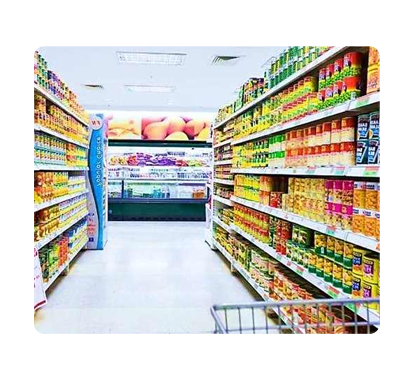A supermarket project is one of the basic commercial projects that meet customers’ daily needs by offering a variety of goods and products in a convenient and modern shopping environment. The project aims to provide a comprehensive shopping experience that includes everything a customer needs, from fresh food products such as fruits, vegetables, meat, and dairy products, to consumer goods such as detergents, household supplies, and personal care products. What distinguishes a supermarket project is its focus on providing high-quality products at competitive prices, in addition to providing periodic offers and discounts that ensure customer satisfaction and increase their loyalty. The project relies on thoughtful department organization for easy access to products, while providing convenient payment methods and efficient customer service. The project also offers additional services such as express home delivery and online shopping options to meet customer needs in various circumstances. Thanks to its strategic location and professional management that oversees daily operations, a supermarket project can attract a diverse customer base and generate sustainable profits, making it a successful business with significant investment feasibility.

The supermarket project is an integrated shopping destination that meets all customers’ daily needs by offering a wide and diverse range of food and consumer products in one location. The project includes a number of specialized sections that offer meat and poultry products and their varieties, in addition to fresh and frozen fish. It also features a rich selection of dairy products and derivatives, such as cheese, yogurt, and butter, with a special section for fresh vegetables, fruits, and dates, ensuring customers enjoy a variety of healthy options. The supermarket project also includes sections for paper products, detergents, and personal supplies, in addition to dried foods such as legumes, nuts, and various beverages, in addition to frozen vegetables to suit the needs of a fast-paced lifestyle. The supermarket project boasts a cooperative and highly qualified team, striving to provide exceptional service and ensure a convenient and easy shopping experience for customers. Thanks to its well-organized interior, high standards of cleanliness, and competitive prices, the project represents a profitable investment opportunity and attracts a wide range of customers.



Focus on product quality and shelf life.
Provide high-quality service.
Ensure product storage quality.
Provide a prime location.
Availability of fresh food.
Effective management supervision.
Ensure general supermarket cleanliness.
Executive summary
Study project services/products
Market Size Analysis
Risk Assessment
Technical study
Financial study
Organizational and administrative study

Service sector in GCC countries
According to the macroeconomic theory of sectors, the economy is divided into three main and large sectors: the first; – is the sector that is based on collecting raw materials and includes mining companies, timber companies, oil exploration companies, in addition to agricultural and fishing industries. The second sector; is the sector that depends on goods and their sale, such as: (car manufacturing, furniture, clothing trade… etc.). As for the third sector, known as the “services” sector; it is the sector responsible for providing and producing services, essentially relying on intangible things, such as: entertainment, health care, transportation, hospitality, restaurants, etc. This theory believes that the more advanced countries are, the more their economies are based on the third sector, unlike primitive countries, which rely mostly on the first sector (the United States of America, for example, the service sector constitutes 85% of its economy).
Kingdom of Saudi Arabia:
The State of Qatar:
Kuwait:
United Arab Emirates:
Sultanate of Oman:
Global Service Sector
The service sector is the major contributor to the world’s gross product; It alone accounts for more than three fifths of this output. The sector does not rely on the production of tangible goods such as automobile and furniture, but rather on the provision of intangible services such as banking, medical care, transportation, hospitality, leisure, etc. The value of the sector market was estimated in 2020 at USD 10,814.49 billion and rose to USD 11,780.11 billion in 2021. The market achieved a CAGR of 8.9%. After recovering from the effects of the coronavirus pandemic, global market experts expect the sector’s market to reach US $ 15683.84 billion by 2025, bringing the market to a CAGR of 7% in the coming years.
